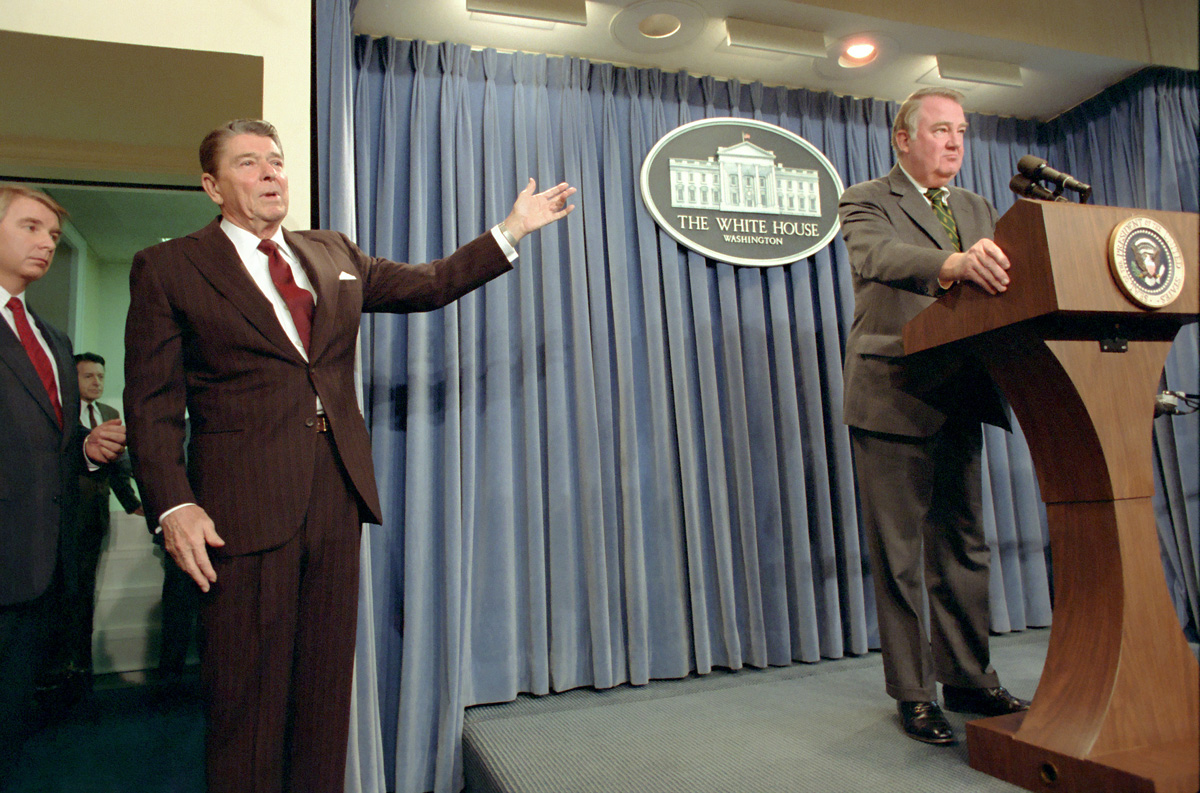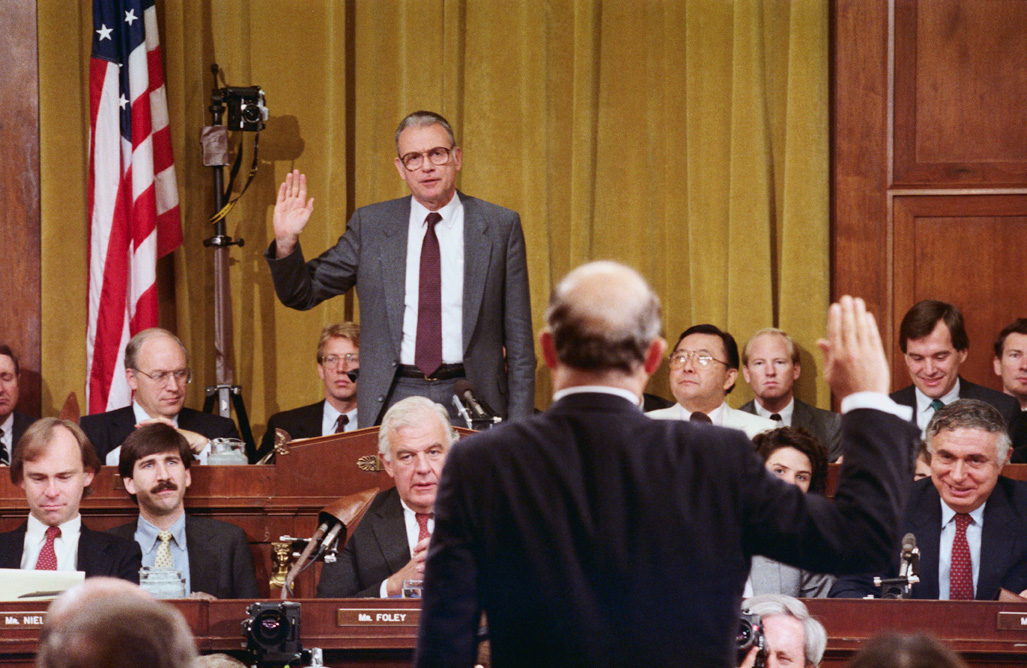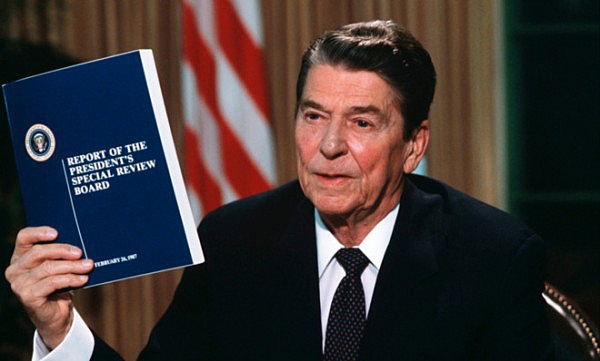Over the years, the National Security Archive has published major document collections, books, and web postings about Iran-Contra that expand on all of these areas of inquiry (see links in left column). Today, the Archive posts a selection of materials that spotlight the last of the elements above � deceitfulness � whose relevance has sadly become more pronounced after a bruising political season marked by examples and allegations of widespread public contempt for facts, evidence and the truth.
[caption id="" align="alignnone" width="853"]
 President Reagan turns over the podium in the White House press room to Attorney General Edwin Meese after revealing the Iran-Contra affair to the nation, November 25, 1986 (Source: Reagan Library and Museum, C38118-29)[/caption]
President Reagan turns over the podium in the White House press room to Attorney General Edwin Meese after revealing the Iran-Contra affair to the nation, November 25, 1986 (Source: Reagan Library and Museum, C38118-29)[/caption]Today�s focus also follows Oxford Dictionaries� selection earlier this month of the term �post-truth� as its Word of the Year, a choice it traced indirectly to the Reagan-era scandal: �Post-truth�seems to have been first used in this meaning in a 1992 essay by the late Serbian-American playwright Steve Tesich in�The Nation�magazine. Reflecting on the Iran-Contra scandal and the Persian Gulf War, Tesich lamented that �we, as a free people, have freely decided that we want to live in some post-truth world.�� (See The Nation, January 6/13, 1992)
The historical record, including thousands of documents and hundreds of hours of testimony that are not possible to reproduce here, bears out the connection between the attitudes evident during the mid-1980s and what Americans have been witnessing in 2016.
The Iran-Contra affair inundated national news coverage starting a few weeks before the November 1986 press conference (as stories about the Contra and Iran operations leaked out) and lasting through Summer 1987. A galvanized media that had faced criticisms for its lax treatment of Reagan seemed eager to make up for it now that it finally had a story of Watergate proportions. Picking up on aspects of secret administration policy that only a few intrepid reporters had noticed before, TV and print outlets uncovered sometimes shocking new information about the lengths to which the Reagan administration had gone to press the Contra war in and around Nicaragua without authorization from Congress.
Similar disclosures came out about National Security Council staff-supervised contacts with Iranian intermediaries and Israeli counterparts, along with covert missile shipments from U.S. military stocks to Iran. Various committees in Congress hastily held hearings that produced more discoveries along the same lines.
Eventually, a joint congressional select committee was convened and an independent counsel appointed by the courts, both of which uncovered volumes of invaluable documentary evidence of what had transpired, including:
[caption id="" align="alignnone" width="750"]
 President Reagan hosts Saudi King Fahd in the Oval Office, February 11, 1985. During the visit, Fahd pledged to double secret Saudi funding for the Nicaraguan Contras to a level of $2 million per month. Reagan�s national security adviser, Robert C. McFarlane, had quietly solicited the Saudis for aid several months earlier in an attempt to get around congressional restrictions on U.S. funding for the rebels. (Source: Reagan Library and Museum, C27253-9)[/caption]
President Reagan hosts Saudi King Fahd in the Oval Office, February 11, 1985. During the visit, Fahd pledged to double secret Saudi funding for the Nicaraguan Contras to a level of $2 million per month. Reagan�s national security adviser, Robert C. McFarlane, had quietly solicited the Saudis for aid several months earlier in an attempt to get around congressional restrictions on U.S. funding for the rebels. (Source: Reagan Library and Museum, C27253-9)[/caption]- After being explicitly prohibited from aiding the Contras with military or intelligence support, the president and his top advisers had agreed to solicit financial and other material backing from a slew of foreign governments (Document 01), from Saudi Arabia, to China, to the Sultanate of Brunei, to apartheid South Africa. No effort was ever intended to notify Congress, which had constitutional authority over funding for those activities
- When the approaches to foreign governments seemed not to be enough, National Security Council staffer Oliver North, the main foot soldier of the affair, with authorization from at least one of his superiors, National Security Adviser John Poindexter, diverted revenues from the illicit Iran missile sales to the Contras � the activity that garnered the most attention in the scandal
- Reagan had authorized direct talks with Iran to bargain for American hostages being held by Hezbollah in Lebanon, in direct contradiction of his own black-letter policy, and disregarding statutory requirements to justify his decision in writing and notify Congress (Document 02)
- When Reagan�s senior aides told him the Iran deals were illegal, he told them flatly that he was willing to face �charges of illegality� (Document 03)
- After the covert Contra support operation was exposed with the shooting down of a U.S.-backed supply plane (in October 1986), State Department and CIA officials testified falsely to Congress about U.S. ignorance of the program. Their testimony eventually produced guilty pleas to criminal charges of misleading Congress.
- After the Iran deals were leaked to a Lebanese news magazine, the White House recognized it would be much harder to hide their role in this instance. The president, vice president and other top aides rallied around to protect the president and the covert policy by explicitly promoting a cover story that departed in significant ways from the truth (Document 08)
- Vice President George H. W. Bush was substantially aware of, and even participated in aspects of, the illicit operations even though he denied it vociferously at the time. Confirmation eventually came in the form of dictated notes which he had refused for years to turn over to the independent counsel (Document 06), as well as in the form of other documents about proscribed quid pro quo deals with the Honduran government.
- Secretary of State George P. Shultz, while standing out as one of the few officials (along with Defense Secretary Caspar W. Weinberger) to directly speak against the Iran deals to the president, also knew more than he admitted to Congress and the independent counsel � as did Weinberger. Some of the notes of his debriefings to State Department aides, handwritten by Charles Hill, are among the most explicit records available about the atmosphere of deceit � and self-deception � within the White House and the administration (Document 07)
[caption id="" align="alignnone" width="517"]
 Former National Security Council staffer Oliver L. North takes the oath before testifying before the joint congressional select committees, July 7, 1987. (Source: Americanheritage1.com)[/caption]
Former National Security Council staffer Oliver L. North takes the oath before testifying before the joint congressional select committees, July 7, 1987. (Source: Americanheritage1.com)[/caption]Much of this evidence did not surface for years because key participants withheld their personal papers, diaries and notes from prosecutors. The picture that finally emerged was of high-risk policies carried out in secret, not because they were legitimate national security concerns but because they ran directly counter to declared U.S. policy, presidential public statements and formal assurances to Congress. The truth needed to be withheld not because foreign powers might benefit (dozens of other governments were already in the loop about the various goings-on, often through direct contacts with U.S. officials), but because congressional funding for key presidential priorities would be jeopardized and the political repercussions of disclosure would be devastating.
President Reagan himself spoke passionately about his actions in connection with the Iran deals, but his insistence that he had not traded arms for hostages and other obvious untruths only undermined his credibility with the public. It took months before Nancy Reagan and other advisers could persuade him to acknowledge the facts (Document 09).
Each of these dubious activities, both the original policies and the subsequent cover-up, in its way laid bare assumptions by key officials about the scope of presidential power. Their views would later astonish members of Congress and members of the judicial branch by their breadth. Although Reagan rarely chose to raise the constitutional question of executive branch authority directly, there were in fact attempts by, among others, Attorney General Edwin Meese and his colleagues in the Justice Department, to press their argument, which went well beyond generally accepted interpretations (Document 05). Similar notions of presidential power were apparent in the congressional select committees� Minority Report, which was overseen by then-committee member and future Vice President Dick Cheney, and in the Justice Department�s intervention � �unprecedented� according to presiding Judge Gerhard Gesell � against the independent counsel in support of dropping key charges in the Oliver North trial. (See the discussion in Byrne, Iran-Contra, pp. 303-304, 313.) These presumptions clearly survived in the thinking of subsequent presidential administrations, particularly that of George W. Bush.
[caption id="" align="alignnone" width="828"]
 House Iran-Contra committee chairman Lee H. Hamilton swears in former National Security Adviser John M. Poindexter, July 15, 1987. To Hamilton�s right is ranking member Dick Cheney (R-WY); to Hamilton�s left is Senate Iran-Contra committee chairman Daniel K. Inouye (D-HI). (Source: Byrne, Iran-Contra, Wally McNamee/CORBIS)[/caption]
House Iran-Contra committee chairman Lee H. Hamilton swears in former National Security Adviser John M. Poindexter, July 15, 1987. To Hamilton�s right is ranking member Dick Cheney (R-WY); to Hamilton�s left is Senate Iran-Contra committee chairman Daniel K. Inouye (D-HI). (Source: Byrne, Iran-Contra, Wally McNamee/CORBIS)[/caption]While much of Iran-Contra�s obfuscation and maneuvering took place behind closed doors, the full force of the deceptions (and self-deceptions) perpetrated by Reagan administration officials would eventually come out in the congressional hearings of Summer 1987. Televised to the nation, the proceedings started out with broad expectations of a Watergate-style exposure of wrongdoing and Congress� dressing down of White House overreach. Instead, witness after witness took the offensive, defending their actions � even their acknowledged lies and potentially criminal acts � as morally justified, as acts of patriotism, or as selfless deeds in support of the president. For many viewers, the legal and ethical implications of the offenses Congress did expose were obliterated by the emotional appeals of the witnesses.
No-one outperformed Oliver North in the role of true-believing scapegoat. The Marine lieutenant colonel, bedecked in full uniform, unabashedly defended his record of serial lying to Congress, to his own professional colleagues, and to government investigators. He claimed not to be proud of what he had done then emotionally took credit for selfless service to the nation and the president. His testimony rocked the committees on their heels and drew stunned reactions from around the country even as it helped build a vocal band of supporters who called themselves �Ollie�s Army.�
The congressional hearings were an important moment in the development of the �post-truth� society. And its ramifications were significant. The build-up of loud and aggressive support for North helped bolster the administration, which had been on the defensive for months. Members of the select committees later admitted they consciously curtailed their investigation because of the overwhelming public outcry for North and the president � an irony since the former staffer and the president�s close aides were squarely at odds over who was to blame for the scandal.
The fact that much of the public accepted these self-righteous justifications by North and others reached as far as the criminal process as well. Independent Counsel Lawrence Walsh came under steady attack by the White House, supporters in Congress, and segments of the media who criticized him for hyper-partisanship and massive overspending. The wall of noise this created served to drown out many of the arguments Walsh and his supporters tried to make about the unusual nature of the investigation into potential high-level malfeasance involving sensitive intelligence operations.
[caption id="" align="alignnone" width="785"]
 Former Judge Lawrence Walsh after his appointment as independent counsel for Iran-Contra matters, December 19, 1986. (Source: Byrne, Iran-Contra, Wally McNamee/CORBIS)[/caption]
Former Judge Lawrence Walsh after his appointment as independent counsel for Iran-Contra matters, December 19, 1986. (Source: Byrne, Iran-Contra, Wally McNamee/CORBIS)[/caption]Members of Walsh�s staff complained about White House unresponsiveness and obstacles to their inquiry. While many thousands of pages were turned over, the charges that critical material had been left out turned out to be true when it emerged that Vice President Bush, Defense Secretary Weinberger, White House Chief of Staff Donald T. Regan, aides to George Shultz and others had failed to turn over their personal notes to the prosecution. This obstructionism clearly contributed to other sources of delay, which in turn fed charges of unreasonableness by Walsh�s critics. Again, the legal implications of the criminal charges being filed and contemplated apparently counted for less in the eyes of many Americans than how they felt about the accused.
The final act of post-truthism came with then-President George H.W. Bush�s decision to pardon several key participants in Iran-Contra. Among them were defendants who had not even had their day in court, thus taking Bush further than other presidents have been willing to go with the pardon power. The not-so-subtle implication of the act was to make it impossible to pursue already-developed plans to investigate Bush himself in greater detail. Walsh, already disillusioned by years of overcoming political hurdles, could no longer contain his outrage, telling Newsweek: �It�s hard to find an adjective strong enough to characterize a president who has such contempt for honesty.� (Newsweek, January 4, 1993)











